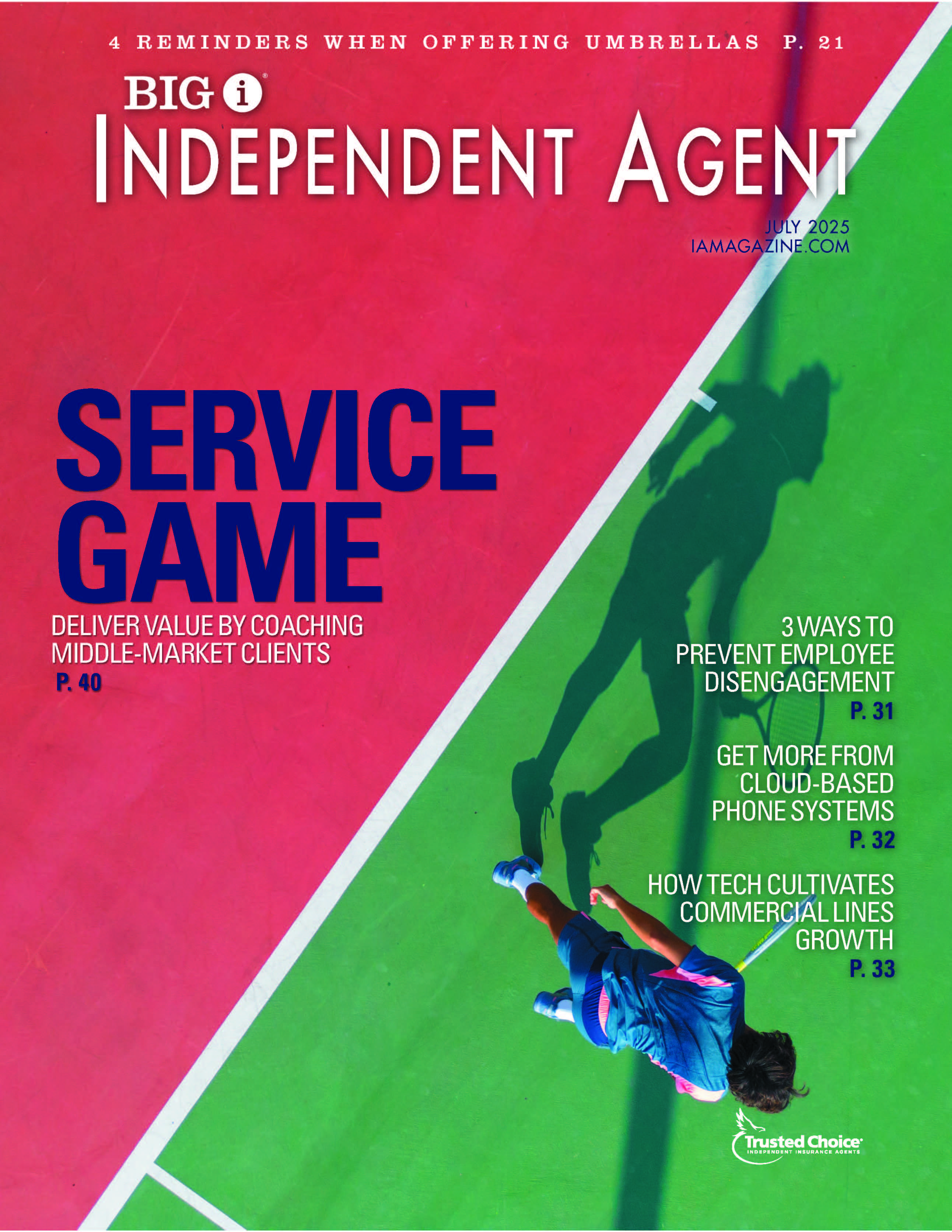Why Property-Casualty Agencies Should Consider Cross-Selling Opportunities in Life-Health

By: Dave Evans
As part of the risk management process, independent agents routinely ask their clients about what new risks they face. But how often do agents ask themselves the same question about their own agency’s business risks and opportunities?
Agencies are facing increased competition from existing and emerging distribution channels, meaning growth must come through seizing opportunities. One of the best ways to do that is through cross-selling.
For property-casualty-oriented agencies, cross-selling conversations center around lines that remain in the p-c universe, such as auto, umbrella, cyber or professional liability. But why don’t more p-c agencies look for cross-selling success in the life-health and benefits world?
When it comes to individual life, disability and lifetime income, also known as annuities, one fundamental reason—aside from licensing considerations—is that independent agencies receive recurring revenues in p-c lines versus, at least in personal l-h lines, the more up-front compensation for life and disability insurance.
But after a look at the competition, your agency might be more willing to tackle the obstacles to break into the l-h market, equipped with a unique services mindset and the tools needed to grow efficiently.
The Competitive Landscape
Independent agents are well aware of the tremendous growth of large brokers accomplished through acquisitions fueled by private equity. Several major brokers are turning to outsourcing accounts whereby small commercial accounts are being handed off in return for splitting commissions.
Another distribution channel threat is the aggressive competition that national and regional payroll companies represent as they pursue certain commercial lines of business. Professional employer organizations (PEOs) are a variation on the one-stop bundling approach, even though supposed economies of scale may prove elusive. Additionally, aggregators or clusters are providing their “Main Street” alliance members with employee benefits resources to share commissions between the agency and the alliance.
In August 2020, cross-selling was clearly the impetus for investment bank Morgan Stanley when they announced that they will now be offering p-c insurance to their high net-worth clients. To do so, Morgan Stanley teamed up with insurance brokers HUB International, Marsh Private Client Services and Willis Towers Watson.
The question remains: Can an independent insurance agency continue to do business as usual and fend off these emerging competitive threats from other distribution channels?
Recalibrating Agency Services
Is your agency taking a client-centric approach? In other words, are you selling policies to cover a specific asset, such as home, auto and business, or do you employ a process to evaluate and holistically transfer risk?
If the producer is focused on quoting, binding and then handing off the account to the customer service representative who serves the client in a reactive mode, that makes it more challenging to cross-sell. Unfortunately, that leads to the agency missing out on the opportunity to round out the account relationship, box out the competition and provide additional revenues.
“We have been very intentional about our cross-selling efforts and have found success in rounding clients out on multiple sides of the agency,” says Quincy Branch, CEO of Branch Benefits Consultants in Las Vegas. “We also found that our cross-selling efforts have helped promote our culture of collaboration because we now get multiple conversations happening between our commercial and benefits staff, or the personal lines and commercial lines staff.”
Agencies should perform a holistic assessment to ensure they’re covering all their clients’ needs. But what does it mean to perform a “holistic assessment?” The key aspect is to take the time to gather information through a “client needs analysis”—objectives, work, family, assets, hobbies, activities and more. Once the agent ascertains their situation and determines what’s important to the client, they can help them decide what risks to retain, mitigate or transfer to insurance.
After confirming the client’s objectives, agents should also consider the client’s access to benefits, such as those provided by their employer, the government, family and other avenues, to arrive at recommendations.
But do clients want to spend all that time going over insurance?
One misconception among agents is that the lives of millennials—who recently surpassed baby boomers to become the largest living adult generation in the U.S., according to Pew Research—are so hectic that they don’t want to take the time to learn from an agent. Actually, 80% of millennials who worked with agents said they want their agent to help them understand insurance by talking them through their coverage, what to expect if they have a claim, and the unique features of their policy, according to a 2019 Liberty Mutual and Safeco study.
Your clients want to invest the time to develop an individualized approach. The question is: Do you?
Cross-Selling Opportunities
Opportunities across the p-c and l-h divide can be found in both commercial and personal lines.
Starting with commercial lines, business owners policies (BOPs) have evolved to the point where a single policy using endorsements can meet most businesses’ needs. The commission revenue may make it difficult for an agent to profitably invest much time in the account but cross-selling l-h and employee benefits provides an additional revenue source from existing clients.
Cross-selling also opens the door to have a conversation with business owners regarding their personal insurance situation. One area that agents often overlook is disability insurance. It connects back to the business interruption or overhead insurance commercial insurance discussion and the most efficient way to approach the risk.
Personal lines also bring cross-selling opportunities. Life and disability insurance are the most common targets, but an emerging risk is “longevity risk,” the possibility of someone being unable to maintain their standard of living in retirement.
Longevity risk is a topic agents should discuss with clients 55 or older—but there are good and bad ways to go about it. The traditional approach to broaching the long-term care insurance (LTCi) topic is to provide a proposal with robust benefits of $300 per day, a 3% inflation rider, a 90-day elimination period, and, of course, a hefty price tag. As a result, the client often experiences sticker shock.
With the coronavirus pandemic, clients are understandably hesitant about moving into an assisted living facility when they need assistance. Instead, they want to stay in their home as long as possible.
Knowing that goal may be front of mind for many clients, agents should propose LTCi for tax-free in-home benefits after satisfying the Activities of Daily Living (ADL) criteria. And by using a longer elimination period, such as 180 days, excluding an inflation rider and selecting a big daily benefit such as the shared-care benefit, the annual cost can be in the hundreds of dollars, not thousands. Also, in-home LTCi benefits can be paid without a waiting period. Business owners can have the policy structured to be tax-deductible, subject to the annual maximum.
The LTCi discussion should not be limited to older clients. For young people that have good incomes, agents should discuss how they, perhaps teaming up with siblings, can give something back to their parents by paying for LTCi with an emphasis on in-home care. The cost might be as low as $200 for two siblings to pay for their parents’ policy. It also helps them know that their parents will have resources in their old age.
The other longevity risk discussion that agents should have with clients is the opportunity to receive guaranteed lifetime income through single premium and deferred income annuities.
For healthy individuals concerned about the financial burden of a long retirement, utilizing “mortality credits”—pooling life expectancies to provide survivors with the maximum income—is a tactical way to allocate a portion of a client’s retirement savings that isn’t subject to stock market returns and interest rates.
“These lifetime income annuities are not the complicated ones,” says Robert Holt, Big “I” vice president, life and annuity business development. “Rather, they are an effective tool for agents to help with longevity risk, don’t involve medical underwriting and provide an additional source of revenue from the agency’s personal lines clients.”

Monetizing Your Agency’s Data
Often, the key to cross-selling is in existing agency management system (AMS) data. However, integration and usability are always concerns because while your AMS purports to be a one-stop shop, its focus is p-c and doesn’t translate as well for capturing l-h-related information. Quite often, the “tickler” dates are built into p-c renewal dates, which may or may not be optimal for using a holistic client-centric approach.
Agencies should centralize the client data into the AMS which can be date- and time-stamped and updated rather than relying on piecemeal information provided through email.
For example, consider a commercial lines client that’s a medical practice. Investing time to meet with the partners and office manager can pay big dividends, with opportunities to write the commercial general liability policy, including cyber and employment practices liability insurance, as well as professional liability, life, disability, dental, LTCi and even longevity annuities.
A p-c agent doesn’t have to be an expert in all areas—rather, using data forms, they can capture the information, get PDFs of the policies and then work with the respective agency experts to provide a comprehensive proposal.
What shouldn’t happen is that the p-c producer only touches base with the client at renewal time, thus missing an opportunity to help the client solve the new risks that life events can bring from a l-h perspective.
Agencies that embrace a client-centric practice can spend more time on each client, which increases retention, lowers errors & omissions exposure and results in more referrals.
Clients sometimes use another agent to write life or disability insurance for the simple reason that the client didn’t know the agency offered those types of insurance. A cardinal sin of sales is assuming your prospects know what you do and offer.
When was the last time your agency did a content review of what the agency puts on their website and social media? If the agency does not want to expend valuable time and resources developing content—or providing incorrect information—Trusted Choice® provides consumer-friendly content that can be easily adopted for your print and digital messaging.
Given the blurred lines of the competitive landscape, agencies need to revisit their approach to cross-selling. As agencies ramp up their social media and digital marketing presence, they should develop effective tactics to harness their agency’s client data and involve the entire agency staff in the process to ensure continued growth of the agency.
Dave Evans is senior director of Team & Total Insurance Solutions LLC and co-founder of 401ksleuth LLC, an independent financial education firm dedicated to helping companies lower their employees’ financial stress by improving employees’ financial literacy.
REINING IT INAs you gather information on your clients’ risks, define what the relationship is and isn’t. Unless an agent is appropriately licensed, they should not comment on investment allocations or portray the data gathering as “comprehensive financial planning” and other representations that would give a false impression. Instead, they should clarify that they are requesting necessary information to confirm that their risks are adequately covered relative to their needs and budget.—DE |









